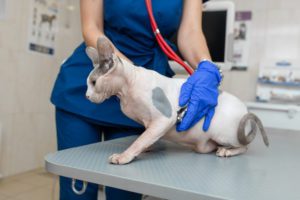Feline Alopecia: Is Hair Loss on my Cat an Emergency?
Feline Alopecia: Is Hair Loss on my Cat an Emergency?
Finding out that your cat is losing clumps or patches of fur is pretty alarming, especially if they are showing other signs of being sick or possibly having a medical condition. While it is definitely normal to be worried about finding your cat losing hair, don’t panic. Most of the time alopecia in cats is not a sign of a medical emergency.
Usually, alopecia in cats is caused by excessive scratching or grooming. Most of the time cats do this because of allergies or a skin condition that causes them to be itchy. However, these are not the only causes of alopecia in cats.
In this article, we will be explaining everything that cat owners need to know about alopecia, or hair loss, in cats. This will include going over what the different types of alopecia are, what causes alopecia in cats, and whether or not alopecia in cats can be treated by a vet. Alright, let’s jump right into it.

What is Feline Alopecia?
Alopecia refers to when a mammal starts losing their hair or fur. In cats, alopecia can refer to adult cats losing their fur or kittens being born with either very thin fur or with bald patches. Here is a bit more on the two different types of alopecia that can occur in cats.
Congenital Alopecia
Congenital alopecia refers to kittens that are born with the condition. Most of the time, congenital alopecia is caused by a genetic defect, and it should not cause the cat any discomfort.
Acquired Alopecia
Meanwhile, acquired alopecia refers to a cat that was born with a full, healthy coat of fur but suddenly starts to lose their hair, Cats with acquired alopecia will usually start losing their fur due to a medical condition.
Why do Cats Get Alopecia?
There are many different possible causes for alopecia in cats. Particularly, for acquired alopecia. Here are some possible causes for acquired alopecia in cats:
- Skin infections (usually ringworm, yeast infections, and mites causing mange)
- Allergies
- Inflammation in an organ or the anal glands
- Endocrine disorders and diseases (ex: Cushing’s disease, hyperthyroidism, etc.)
- Nursing and pregnancy
- Prolonged fevers
- Autoimmune disorders
- Anxiety and obsessive-compulsive grooming or scratching
- Cancer
Meanwhile, there are only three main genetic defects that cause congenital alopecia in cats. These include:
- Alopecia universalis (kitten is born without any hair)
- Hereditary hypertrichosis (kitten is born with a very thin coat of hair, and they lose it over time)
- Follicular dysplasia (kitten is born with a full coat of hair, but it starts thinning out over time)
Other Symptoms for Cat Owners to Look Out for Alongside Hair Loss
Cats born with congenital alopecia are not going to exhibit any symptoms alongside their lack of hair. However, cats with acquired alopecia likely will exhibit other symptoms of a medical condition. Here are some symptoms that cat owners should look out for and take note of if their cat starts losing hair suddenly:
- Vomiting and diarrhea
- Fever
- A reduced appetite
- Lethargy
- Increased urination and thirst
- A large belly (like a pot belly)
- Inflammation around the ears
- Conjunctivitis
- Sneezing and coughing
- Discharge coming from the nose or eyes
- Excessive grooming or scratching
While most of these symptoms are not necessarily a sign of a medical emergency, it is still a good idea to take your cat to the vet when you notice them. This is especially true if they occur alongside hair loss. However, you should take your cat to an emergency vet immediately if they are exhibiting a pot belly like appearance.
Can Vets Treat Alopecia?

Alopecia in itself is not treatable by a vet in cats. However, acquired alopecia can usually be reversed once the condition causing it has been properly treated. Unfortunately, there is nothing that can be done for congenital alopecia in cats.
Is Alopecia in Cats Curable?
The answer to this question depends on the type of alopecia that your cat is experiencing. For acquired alopecia, alopecia is often curable. Your cat’s hair should start to grow back once the condition causing their alopecia is properly treated. The only exception to this rule would be an incurable condition that is causing your cat to have acquired alopecia.
Unfortunately, congenital alopecia is never curable. Kittens born with alopecia will have the condition throughout their lives. However, these cats should not experience any pain or itchiness from their hair loss or lack of hair. This is good news, and it just means that your cat with congenital alopecia will just have a unique appearance.
How Long Will it Take for my Cat’s Fur to Grow Back?
Luckily, most cats with acquired alopecia will start to grow their fur back in once the condition causing their alopecia has been treated. For short-haired cats, you will likely need to wait between 2 and 3 months before your cat’s coat is fully grown back in and as full as it used to be.
Meanwhile, long haired cats take a bit longer for their fur to fully grow back in. If you have a long haired cat that had acquired alopecia, then it would not be unusual for you to have to wait between 3 and 6 months for your cat’s hair to grow back in and appear completely normal. Cats with a medium length coat will take somewhere in between these two time frames.
Is Alopecia in Cats an Emergency?
Most of the time alopecia in cats is not considered to be a medical emergency. This is because hair loss in cats is not a sign that their life is in immediate danger. However, it may be a good idea to take your cat in to see your regular vet, especially if your cat has started losing hair suddenly and is also experiencing other symptoms.
This way your vet can take a look at what is going on and start treating your cat to make them feel more comfortable. Luckily, congenital alopecia is never an emergency, and cats can live full lives with it.
If your pet is facing a veterinary emergency in the Atlanta, GA region, The Village Vets is here to help, 24 hours a day. Give us a call right away at (404) 371-9974 so we can prep for your arrival.

